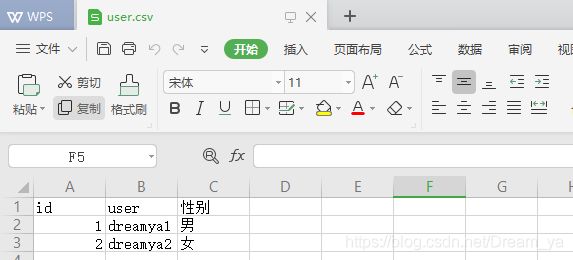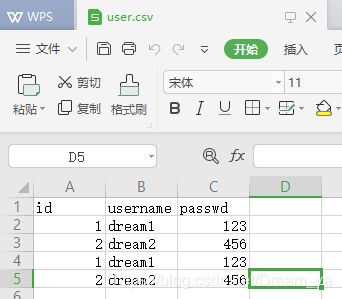一、csv文件介绍
1、csv文件简介
逗号分隔值(Comma-Separated Values,CSV,有时也称为字符分隔值,因为分隔字符也可以不是逗号),其文件以纯文本形式存储表格数据(数字和文本)。纯文本意味着该文件是一个字符序列,不含必须像二进制数字那样被解读的数据。CSV文件由任意数目的记录组成,记录间以某种换行符分隔;每条记录由字段组成,字段间的分隔符是其它字符或字符串,最常见的是逗号或制表符。通常,所有记录都有完全相同的字段序列。通常都是纯文本文件。
2、为什么要使用csv文件
在Linux中我们可以通过命令在数据库中把表导出来为csv结尾的文件,其实就是以逗号分割分txt文件,此文件我们可以在windows中打开并且为表格的形式,方便我们进行查看与再次操作。
eg:
MariaDB [test]> select * from 表名 into outfile "/tmp/test.csv" fields terminated by ",";
二、csv文件查看
注意:这里我是把csv文件和python代码都放在同级目录,否则要指定路径!!!
1、测试文件创建
(1)这里我们以windows中的csv文件来做实验
(2)我们可以选中内容复制进去,也可以上传到linux中,这里我们选择前者
[root@python _test]# vim test.csv ###可以发现复制进去的是以空格为分隔符 id username passwd age 1 dream1 123 21 2 dream2 456 22 3 dream3 789 23 ### 把空格替换为逗号 [root@python _test]# sed -i 's/\s\+/,/g' test.csv
2、查看csv文件(列表)
(1)读出结果
[root@python _test]# vim _test.py
#!/usr/bin/env python
#coding:utf-8
import csv
with open('test.csv', encoding="utf-8") as f:
reader = csv.reader(f)
print(reader)
print(list(reader))
### 查看结果
[root@python _test]# python _test.py
<_csv.reader object at 0x7f54d9a01eb8>
[['id', 'username', 'passwd', 'age'], ['1', 'dream1', '123', '21'], ['2', 'dream2', '456', '22'], ['3', 'dream3', '789', '23']]
(2)遍历(从第一行读取)
[root@python _test]# vim _test.py
#!/usr/bin/env python
#coding:utf-8
import csv
with open('test.csv', encoding="utf-8") as f:
reader = csv.reader(f)
for i in reader:
print(reader.line_num, i)
### 查看结果
[root@python _test]# python _test.py
1 ['id', 'username', 'passwd', 'age']
2 ['1', 'dream1', '123', '21']
3 ['2', 'dream2', '456', '22']
4 ['3', 'dream3', '789', '23']
(2)遍历(从第二行读取)
[root@python _test]# vim _test.py
#!/usr/bin/env python
#coding:utf-8
import csv
with open('test.csv', encoding="utf-8") as f:
reader = csv.reader(f)
### 这个就是我们得表头
next(reader)
for i in reader:
print(reader.line_num, i)
### 查看结果
[root@python _test]# python _test.py
2 ['1', 'dream1', '123', '21']
3 ['2', 'dream2', '456', '22']
4 ['3', 'dream3', '789', '23']
3、查看csv文件(字典)
(1)查看
[root@python _test]# vim _test.py
#!/usr/bin/env python
#coding:utf-8
import csv
with open('test.csv', encoding="utf-8") as f:
reader = csv.DictReader(f)
### 表头
print (reader.fieldnames)
print (reader,type(reader))
for i in reader:
print (i)
### 查看结果
[root@python _test]# python _test.py
['id', 'username', 'passwd', 'age']
OrderedDict([('id', '1'), ('username', 'dream1'), ('passwd', '123'), ('age', '21')])
OrderedDict([('id', '2'), ('username', 'dream2'), ('passwd', '456'), ('age', '22')])
OrderedDict([('id', '3'), ('username', 'dream3'), ('passwd', '789'), ('age', '23')])
(2)查看第一列(id)
优点:我们不知道表头在具体那列,我们可以通过表头名来获取整列数据,即我们可以随便调整顺序也不会影响我们的数据读取!!!
[root@python _test]# vim _test.py
#!/usr/bin/env python
#coding:utf-8
import csv
with open('test.csv', encoding="utf-8") as f:
reader = csv.DictReader(f)
for i in reader:
print (i['id'])
### 查看结果
[root@python _test]# python _test.py
1
2
3
4、写入文件(列表)
[root@python _test]# vim _test.py
#!/usr/bin/env python
#coding:utf-8
import csv
li = [["id","user","性别"],["1","dreamya1","男"],["2","dreamya2","女"]]
with open('user.csv', 'w', newline='') as f:
writer = csv.writer(f)
for i in li:
writer.writerow(i)
### 查看结果
[root@python _test]# python _test.py
[root@python _test]# cat user.csv
id,user,性别
1,dreamya1,男
2,dreamya2,女
下载到windows中查看:
[root@python _test]# sz user.csv
5、写入文件(字典)
[root@python _test]# vim _test.py
import csv
#coding:utf-8
headers = ['id', 'username','passwd']
li = [{'id':'1','username':'dream1','passwd':'123'},
{'id':'2','username':'dream2','passwd':'456'},
]
with open('user.csv', 'w', newline='') as f:
### 表头传入
writer = csv.DictWriter(f, headers)
writer.writeheader()
### 一行一行写入
for i in li:
writer.writerow(i)
### 直接把li写入(多行)
writer.writerows(li)
### 查看结果
[root@python _test]# python _test.py
[root@python _test]# cat user.csv
id,username,passwd
1,dream1,123
2,dream2,456
1,dream1,123
2,dream2,456
windows中查看:
[root@python _test]# sz user.csv
总结
到此这篇关于Python中CSV文件(逗号分割)的文章就介绍到这了,更多相关Python CSV文件逗号分割内容请搜索脚本之家以前的文章或继续浏览下面的相关文章希望大家以后多多支持脚本之家!


